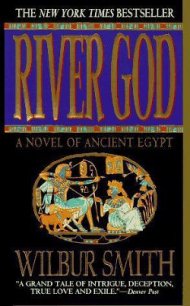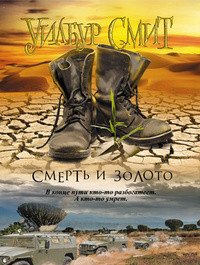Men of Men - Smith Wilbur (книги бесплатно без txt) 📗
When at last he lifted his head the first thing he saw was the falcon squatting opposite him on its greenstone plinth. It seemed to be smiling, a cruel and sardonic twist to the predator's beak, but when he stared at it Zouga saw that it was merely a trick of shadow and sunlight through the thorn branches.
The kopje-walloper was a small man, with legs so short that his polished high-heeled boots did not touch the floor when he sat on the swivel piano stool behind his desk.
The desk filled most of the tiny galvanized-iron hut, and it was furnace-hot in the room; the heat quivered and danced down from the roof. On the raw deal planks of the desk stood the accoutrements of the kopie-walloperys trade. The whisky bottle and shot-glasses to mellow the man with stones to sell; the sheet of white paper on which to examine the goods for colour; the wooden tweezers, the jeweller's eye-glass, the balance and scales, and the cheque book.
The cheque book was the size of a family Bible, each cheque form embossed in gold leaf and printed in multicolours, the border depicting choirs of heavenly angels, sea nymphs riding in half clam shells drawn by teams of leaping dolphins, the Queen as Britannia with helmet, shield and trident, twisting cornucopia from which poured the treasures of Empire and a dozen other patriotic symbols of Victorian might.
The cheque book was by far the most impressive item in the hut, not excepting the buyer's flowing silk Ascot tie and the yellow spats that covered his boots. It was unlikely that a digger would be able to refuse payment offered in such flamboyant style.
"How much, mister Werner?" Zouga asked.
Werner had swiftly sorted the glittering heap of diamond chips into separate piles, grading them by size alone for each stone was of the same fine white colour.
The smallest stones were three points, three hundredth parts of a carat, barely bigger than a grain of beach sand, the largest was almost a carat.
Now Werner laid aside his tweezers. and ran his hand through his dark locks.
"Have another whisky," he murmured, and when Zouga refused, "Well, me, I'm having one now."
He poured both glasses full to the brim, and despite Zouga's frown pushed one across to him.
"How much?" Zouga persisted.
"The weight?"Werner sipped the whisky and smacked his thick liver-coloured lips. "Ninety-six carats, all told.
What a diamond it must have been. We will never see the likes again-' "How much in cash?"
"Major, I would have offered you fifty thousand pounds, if that had been a single stone."
Zouga winced and blinked his eyes closed for an instant, as though he had been slapped across the face with an open hand.
With fifty thousand pounds he could have taken Zambezia, money for men, horses and guns, money for wagons and bullock teams, machinery to mine the reef and mill the gold, money for the farms, the seed and implements. He opened his eyes again.
"Damn you, I'm not interested in what might have been," he whispered. "Just tell me how much you will pay for that."
"Two thousand pounds; that's my top price, and it's not an "open" offer."
The stone had splintered into almost two hundred chips. That meant a "pick-up" payment to Bazo of that many sovereigns. Zouga would intensely resent having to make that payment, but he owed it and he would make it. Of what remained after paying Bazo, at least a thousand would go for his share of the new stagings on the number 6 Section.
Eight hundred left, and it cost him a hundred a week to work his claims, so he had won himself two months.
Sixty days, instead of a land. Sixty days instead of a hundred thousand square miles of rich land.
"I'll take it," he said quietly, picked up the whisky glass and drained it. It burned away the bitter taste at the back of his throat.
Ralph's bird was a lanner, one of the true members of the family Falco, long-winged and perfect for hunting the open plains of Griqualand. At last, after many attempts, he had found her and taken her for his own, a falcon and therefore bigger than the male bird, which was not a falcon but a tercel or, in the case of a lanner, a "lanneret".
She was "eyas", the falconers" term for a wild bird taken at the nest when almost full-fledged. Ralph had climbed to the nest high on the top branches of a giant acacia and brought the bird down in his shirt, bleeding where she had raked him with her talons across his belly.
Bazo had helped him fashion the hood and jesses of soft glove leather for the proud head, but it was Ralph who walked her on his hand, hour after hour, day after day, stroking and gentling her, calling her "darling" and "beauty" and "lovely" until she would eat from his fist and greet him with a soft "Kweet! Kweet!" of recognition when she saw him. Then he introduced her to the lure of stuffed pigeon feathers, teaching her to hit it as he swung it on its long cord.
Finally, in the traditional ritual of the falconer, he sat up all night with the bird on his fist and a candle burning beside him. He sat with her in the trial of wills which would prove his domination over her, staring into her fierce yellow eyes, in the candlelight, hour after hour, outlasting her until the lids closed over her eyes and she slept perched upon his fist and Ralph had won. Then at last he could hunt her.
Jordan loved the bird for her beauty, and once she was trained Ralph occasionally let him carry her and stroke the hot sleek plumage under his gentle fingers. It was Jordan who found her name. He took it from Plutarch's Lives, which he was re-reading, and so the falcon was named Scipio, but Jordan accompanied the hunt only once, disgracing himself irretrievably by bursting into tears at the moment of the kill.
Ralph never invited him again.
The same rains that had undermined the number 6 causeway had flooded every depression and vlei for a hundred miles around the New Rush diggings. Slowly, in the hot dry months since that deluge, the shallower pools and swamps had dried out; but five miles south on the Cape Road, halfway to the low line of blue Magersfontein hills, there was still a wide body of open water, and already reed-beds had grown up around its perimeter and colonies of scarlet and ebony bishop birds had woven their hanging basket nests on the nodding reed staffs.
Amongst the reeds Ralph and Bazo built their blind.
They drew the long, leafy fronds down over their own heads, careful not to slice their hands on the razor-edged leaves; the fluffy white silks snowed down on them from the laden seed heads of the reeds, and they plaited the roof of stems in place, concealing themselves from the open sky.
Ralph scooped a handful of black mud and smeared it over his face.
He knew that his white face turned upwards would shine like a mirror, catching the eye of even a high-flighted bird.
"You should have been born Matabele, then you would not need mud."
Bazo chuckled as he watched him, and Ralph made an obscene sign at him with his fingers before they settled down to wait.
It was fascinating to see how Scipio, blind under the leather hood, could still pick up the beat of approaching wings long before the men could see or hear them, and they were alerted by the set of her head and the anticipatory stretch of her talons.
"Not yet, darling," Ralph whispered. "Soon now, darling."
Then Bazo whistled sharply and pointed with his chin.
Across the swamp, still two miles out, very high against the empty sky, Ralph saw them. There were three of them, big black wings curving on the downbeat in that characteristic unhurried, weighty action.




